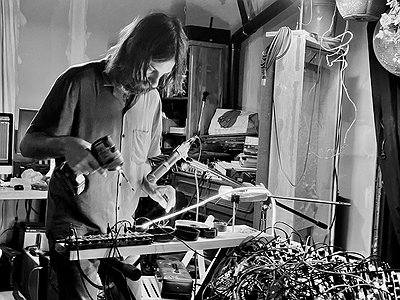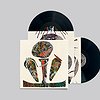Part 1
Name: Matthew Ramolo aka Khôra
Nationality: Canadian
Occupation: Sound artist, composer
Current Release: Khôra's Gestures of Perception is out via Marionette.
Recommendations: Al-kemi - By André Vandenbroeck; The Book of Disquiet - Fernando Pessoa
Where does the impulse to create something come from for you? What role do often-quoted sources of inspiration like dreams, other forms of art, personal relationships, politics etc play?
For me, the impulse to creation is a restless cosmic function and abstractly concerns the tension between necessity and freedom.
While there are arguments to be made to distinguish human creativity from other forms, I’m not one inclined to draw a hard and fast separation between the creative acts of humans and the chemical secretions of an insect, the coursing of water which forges a riverbed, the blue object assembly of a bowerbird, or the delicate sand patterns of pufferfish for example. All of these are simply large time-scale abstractions in the grammars of emanation that define cosmic life.
Human art seems to simply participate in this cosmic pattern, refracting it through cultural meanings, mentation, and nameless inner experience, and so for me an artist is one who willingly pursues transparency of their personality so that this powerful impulse can better realize itself unfettered.
The need to create is both a practical instinct connected to the survival and exploration of life while it is also an evolutionary mutation concerned with expanding the workings of life so as not to limit the horizon of its meaning and concern, it is the pursuit of new dimensions of freedom through a harrowing awareness of the constraints of necessity.
Dreams, artworks, politics, relations among humanity and the environment are all part of the subtle energetic dialogue of the artist with their universe of lived experience so whether any of them serve or are elected as an “impulse” or “source” is only a question of abstraction and intensity. I’m happy to admit of all such revelatory sources but if you want to remain constantly open to creating and serve as a portal for this cosmic function, it’s probably best not to habitually limit where you believe the origin of the impulse derives from and learn to see and intersect with it in everything.
For you to get started, do there need to be concrete ideas – or what some have called a 'visualisation' of the finished work? What does the balance between planning and chance look like for you?
On one level, the work is already complete and concrete in its revelation or what you have called its “visualization”. That is, the unique affect that the artist anticipates realizing through the work has completely shown itself internally.
At the same time, the work, as it is concretely emerging into being through the process of making, inevitably works upon itself in the messy organicism that is process and is caught up in unforeseen feedback loops so the path leading back toward this feeling or vision is often not direct but can be circuitous and take you off in other directions.
These alternate directions need not be viewed as detours from the original impulse but as the navigation of this complex visionary blueprint as it pushes itself out into the world. You could say that there is a phase-space that surrounds the vision of the very possibility of the work and although the work looks differently depending on where you gaze upon it from, this whole space is intimately involved and connected to the world of the original revelation as well.
There is space for both of these seemingly counterposed tendencies (idea to process, or process to idea) in the description of how an artwork “begins” and I don’t think it’s a simple matter to disentangle them.
Is there a preparation phase for your process? Do you require your tools to be laid out in a particular way, for example, do you need to do 'research' or create 'early versions'?
My process is an unbroken one in that I am always working and don’t necessarily orient this work towards particular ends until a specific worldly or social end (ie. in the form of a release or performance or commission for a composition or collaboration) has presented itself separately which is typically long after a specific process or exploration has begun.
Insofar as I am always in the middle of answering questions such as “what is art”, “what is existence”, and “who is it that presides over the manifestation of a work”, this definitely involves a research practice and the constant expansion of tools, perspectives, and techniques, but I am also quite fond of the ancient notion of furor poeticus or poetical furry/madness which is the state in which the artist becomes possessed by divine inspiration in order to fulfill their function.
I won’t truly begin any type of work if I don’t feel like that state or trance has been realized in myself to some extent as I have no real interest in “expressing myself” per say and am happy to be an amanuensis for something that presents itself as a transcendent or animating voice in me, even if, from certain perspectives, that only ends up being a shard or single aspect of my own unconscious.
The extinction of the individual personality to the tradition of art is an age old theme that seems paramount to work of the artist.
What do you start with? And, to quote a question by the great Bruce Duffie: When you come up with a musical idea, have you created the idea or have you discovered the idea?
Everything in the universe seems to me to be fundamentally self-similar across various scales and so even when human naïveté or vanity decides to elect something as “never having before existed”, there is always a basic formal precedent to be unearthed somewhere in nature if you orient yourself properly and search hard enough.
In some respect, artists are often vigilant characters who work from the middle of their lives as various streams and qualities collide and coalesce into something that seems like it appeared out of nowhere but was very much derived from the complex nature of their particular experience.
So on one level, there is an act of aping or compulsive mirroring that is happening which is a fundamental quality of passive life, and on the other hand, there is a form of creative growth that happens through the pursuit of the work which constitutes the discovery or creative perception of a novel form of order in the world.
Under certain lights, discovery looks like creation and vice versa, and both are valid as starting points.
Many writers have claimed that as soon as they enter into the process, certain aspects of the narrative are out of their hands. Do you like to keep strict control or is there a sense of following things where they lead you?
In the spirit of Beckett’s “fail again, fail better” sentiment, it seems that the work and artist can only ever fail to fully achieve the original vision that begets the process of making. In this way, an artwork is out of control by its very nature, including the source of the vision, even if it’s ultimately a relatively conservative work.
It makes organic sense to honour and follow divergent paths as they open up but if the work becomes too removed from the scope of its original vision by the influence of external sources, then reigning in the process could become necessary depending how much stake the artist has placed in the original revelation.
If the original vision is understood as coming from “elsewhere”, wherever that might be, then the artist has no control at all in any case and is ultimately either left to serve the work as it presents itself to consciousness through vision and process or to serve their own image of themselves as an artist, which has its own accompanying karma and dangers.
Often, while writing, new ideas and alternative roads will open themselves up, pulling and pushing the creator in a different direction. Does this happen to you, too, and how do you deal with it? What do you do with these ideas?
I perceive this question as being very similar to the previous question. This certainly occurs as the particular affects of the work start to manifest themselves during the process of making and this creates a tension between the artist’s individual tastes and the vision that animates them.
Often, new ideas that arise appear totally necessary, if unforeseen, to realizing the original vision. Other times, they are true forks in the road and the artist is presented with the difficult choice of whether or not such a road will lead to the manifestation of the work as they understand it.
There are many descriptions of the creative state. How would you describe it for you personally? Is there an element of spirituality to what you do?
What you are calling the “creative state” is for me simply a clear awareness of the nature of existence as it unfolds itself through my given form.
On a fundamental level, you can’t even help the persistence of your existence without overly dramatic intervention, the process that is you is unfolding itself and we are capable of directing this unfolding to some limited extent. It is simply the case that the universe is creative and those who most fully dwell in this experience as it presents itself internally are likely those who are going to be led to produce art.
I think this is something that is completely natural for all human beings who have not been downtrodden or confusedly told that the creative state is a rare and unique one reserved for “genius”.
The element of spirituality certainly factors in but expanding on the meaning of this would require a wholly separate conversation. To paraphrase Nietzsche, a good work of art doesn’t just possess the spirit of the artist but that of their friends and time as well and the experience of tapping into a general condition of the spirit that is transcendent and animated and belongs as much to others as to me is certainly a feature of the experience for me.
The artist penetrates into the darkness of themselves to find the impersonal spirit of everybody else already residing there.







